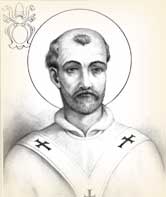 For almost ten months, following the death of Vigilius in June of 555,
the Western church was without a Pope. On March 3, 556, Pelagius, a
Roman of a noble and wealthy family, was chosen to succeed him. The old
man's elevation to the papal throne on this date,
April 16, 556 was marred by irregularity. Three bishops were
needed for his confirmation, but only two were willing to serve; they
were aided by a priest representing of the Bishop of Ostia.
For almost ten months, following the death of Vigilius in June of 555,
the Western church was without a Pope. On March 3, 556, Pelagius, a
Roman of a noble and wealthy family, was chosen to succeed him. The old
man's elevation to the papal throne on this date,
April 16, 556 was marred by irregularity. Three bishops were
needed for his confirmation, but only two were willing to serve; they
were aided by a priest representing of the Bishop of Ostia.After his elevation and before the crowd in the old St. Peter's Basilica built by Constantine, Pelagius affirmed the decisions of the first four ecumenical councils. Then, with cross and Gospel in his hands, he astounded the crowd by assuring them that he had nothing to do with the death of any man. What was this all about? Pelagius was referring to the death of his predecessor, Pope Vigilius, whom he had once branded as a turncoat for first rejecting and then siding with Justinian's opposition to the Three Chapters.
The Three Chapters were three subjects condemned by the Emperor in an edict of 543-4: They were 1. The person and works of Theodore of Mopsuestia, 2. The writings of Theodoret against Cyril of Alexandria and 3. The letter of Ibas of Edessa to Maris. All contained statements with Nestorian leanings. Justinian hoped by this act to appease his Monophysite subjects (those who deny that Jesus is two persons in one). The Eastern bishops signed Justinian's anathemas under protest, but the west was even more reluctant to accept them. Justinian arrested a leading opponent named Vigilius in 545 and detained him in Sicily. Later Justinian brought Vigilius to Constantinople where for a long time he stuck to his position, even excommunicating Patriarch Menas, who returned the favor.
Vigilius finally wearied of the fight, accepted the Three Chapters decision, and was nominated for pope by Justinian. As pope, Vigilius was one of the leaders of the Fifth Ecumenical Council, held in 553 at Constantinople, which condemned the Three Chapters. It was attended by 165 fathers of the church. Vigilius' flip-flopping after having taken such a definite stand made him unpopular in the west. When he died there was suspicion of foul play. That is why Pelagius felt he had to defend himself at his election.
Pelagius inherited some of the strife that marked Vigilius' career. When he agreed to accept the council's decision, the sees of Aquileia and Milan renounced communion with him.
However, before his death in 561, he accomplished much good by relieving poverty and starvation, ransoming prisoners of war and overhauling the papal finances. He was buried in St. Peter's.
Note: this Pelagius is not the same Pelagius for whom the so-called "Pelagianism heresy" was named and which was condemned at the third Ecumenical Council, held in Ephesus in 431).
Bibliography:
- Brusher, Joseph Stanislaus. Popes through the Ages. Princeton, N. J.: Van Nostrand, 1959.
- De Rosa, Peter. Vicars of Christ; the dark side of the papacy. Dublin: Poolbeg Press, 2000; pp. 206 - 211.
- Lea, Henry C. Studies in Church History. Philadelphia: Henry C. Lea; London: Samson, Low, Son, & Marston, 1869; p.20.
- Mann, Horace K. "Pope Pelagius I." The Catholic Encyclopedia. New York: Robert Appleton, 1914.
- Montor, Chevalier Artaud de. Lives and Times of the Popes. New York: Catholic Publication Society of America, 1909.